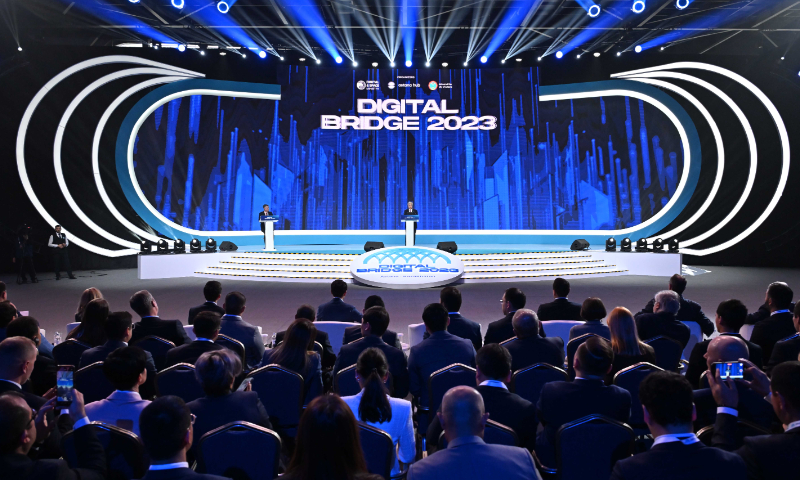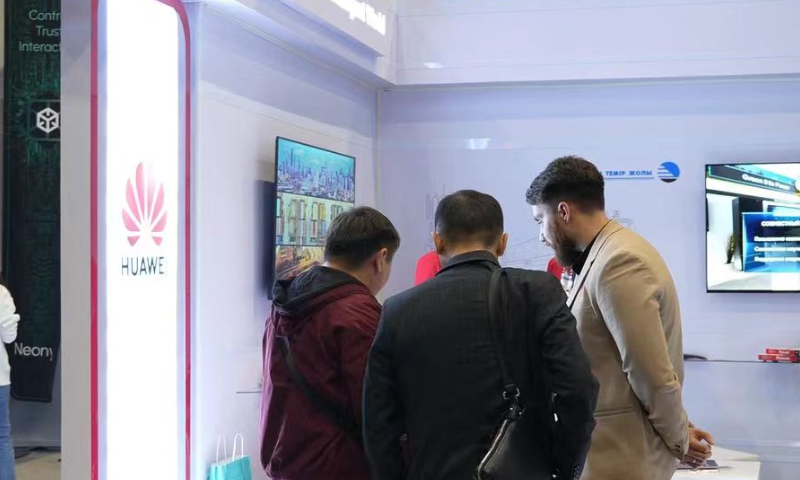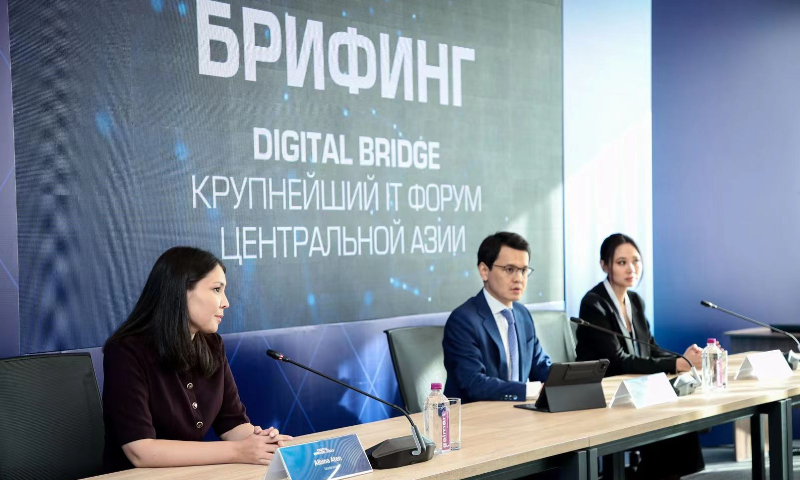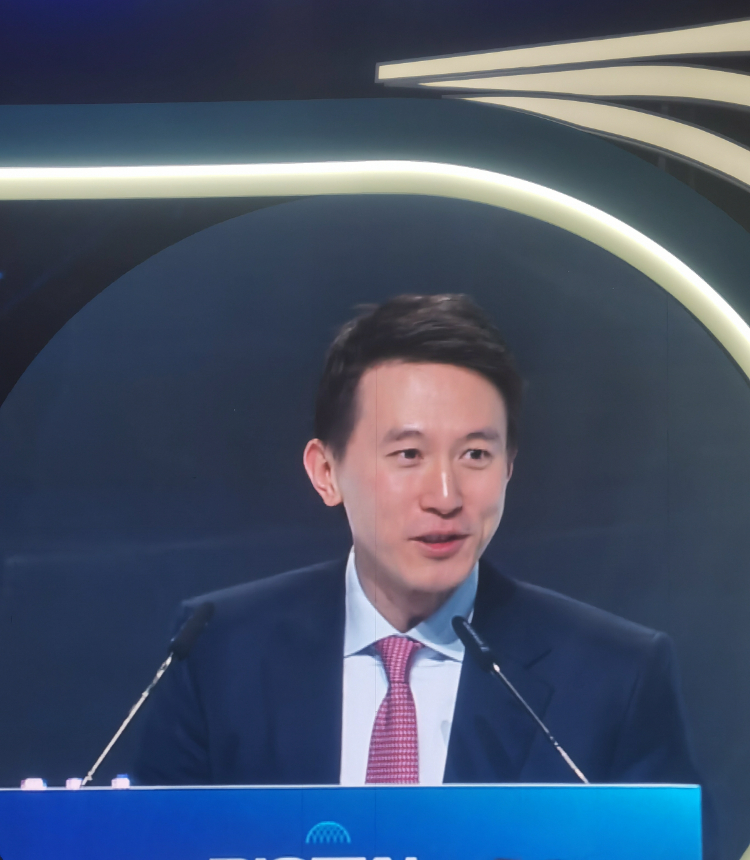IN-DEPTH / IN-DEPTH
Kazakhstan unveils 5G plans with support from Chinese tech giants to transform into a regional digital hub

The opening ceremony of the Digital Bridge 2023 forum in Astana Photo: Courtesy of Astana Hub
President of Kazakhstan, Kassym-Jomart Tokayev, presented an ambitious vision for Kazakhstan's technological future and advanced the deadline for the introduction of the 5G network from 2027 to 2025 during his speech at the recently concluded Digital Bridge 2023 forum in Astana, the capital of Kazakhstan. Chinese technology companies are welcomed and expected to actively participate in the blueprint designed to support Kazakhstan in its journey to become a regional digital hub.
Tokayev emphasized the need to attract international players to the country's venture market, leveraging their expertise and project quality assessment, as Kazakhstan is poised to enter a new era of connectivity and technological advancement with its ambitious plans for the accelerated launch of 5G wireless services.
As tech companies that actively support the construction of Kazakhstan's digital economy, Chinese tech giant Huawei and TikTok, the popular short-video content app owned by Chinese tech company ByteDance, have attracted much attention at the forum.
Bagdat Mussin, the Kazakhstani Minister of Digital Development, Innovation, and Aerospace Industry told the Global Times that the country trusts the quality and safety of Chinese technology.

Representatives visit Huawei's booth at the Digital Bridge 2023 forum in Astana, the capital of Kazakhstan on October 13. Photo: Courtesy of Shana
In front of Huawei's booth at the two-day forum, many guests gathered around the display case of its digital communications equipment and all-scenario products hoping to learn how the company's technology could further help boost local 5G networks.
As Central Asia's largest IT forum, the Digital Bridge this year brought together over 20,000 participants, including representatives from more than 300 IT companies and delegations from 30 countries, far exceeding previous years' participation. This strong turnout demonstrates Kazakhstan's leading position as a digital and fintech hub in Eurasia.
President Tokayev cited expert estimates which indicate that the potential contribution of AI to the global economy is comparable to a quarter of global GDP.
In the last decade, within the framework of the Belt and Road Initiative (BRI), China, as Kazakhstan's neighbor, has shared its digital experience with Kazakhstan, where the Silk Road Economic Belt was first initiated, in becoming the digital center of Central Asia. China has also achieved more practical results in areas such as 5G, big data, cross-border e-commerce, and artificial intelligence.
Huawei, a prominent supplier of ICT infrastructure and smart devices, has backed Kazakhstan's national initiatives and its 2050 Strategy in order to position the country as a digital center in the region. This support involves introducing innovative technologies, implementing best practices, and exchanging knowledge in areas such as intelligent cloud networks, 5G, and storage technologies.
The company has been serving the ICT industry in Kazakhstan since 1998 following the "in Kazakhstan, for Kazakhstan" vision.
The Global Times learned from Huawei that it is a strategic partner to all telecom operators in Kazakhstan, serving a population of over 18 million.
On June 1, 2023, Huawei and Kazakhstan's Ministry of Digital Development jointly released the Digital Hub White Paper, which explores how to make Kazakhstan a digital hub in the Eurasian region. This includes the construction of connectivity hubs, cloud hubs, ICT talent hubs, and ecosystem hubs, opening up a new future for Kazakhstan's digital economy.
The arbitrary bans imposed by some countries of Huawei's technology have not shaken the Kazakhstani government's trust in Chinese technology.

The media conference at the Digital Bridge 2023 forum in Astana, the capital of Kazakhstan Photo: Courtesy of Astana Hub
In a press conference on October 13, Bagdat Mussin, Kazakhstan's Minister of Digital Development, Innovation, and Aerospace Industry, told the Global Times that Kazakhstan welcomes Huawei and that approximately 200 educational centers in local universities have been set up to promote Huawei's technology to the young generation.
Mussin stressed the reliability and safety of Chinese technology while noting that Huawei's technology is included in the implementation phase of Kazakhstan's 5G network building. He said that the country has followed the strict examination and certification processes necessary for the use of such tech to be used in the country.
Alina Abdrakhmanova, the managing director of the Astana Hub, the organizer of the forum, told the Global Times that Huawei has been a long-term partner to their technological research centers, and underscored that Huawei is establishing more infrastructure to ease access for local startups.
Huawei Kazakhstan and the Ministry of Science and Higher Education of the Republic of Kazakhstan signed an MOU at the International 2022 Digital Bridge Forum to cooperate with Kazakhstan's leading universities and educational organizations to open the Huawei ICT Academy, providing more than 3,000 students with ICT-related information and courses.
During a visit to China in mid-May, President Tokayev held a meeting with Huawei Chairman Liang Hua, and welcomed the implementation of the project aimed at training highly skilled Kazakhstani specialists in the IT sphere at the Huawei ICT Academy. The president also supported Huawei's initiatives for cultivating ICT talent in Kazakhstan and nurturing local talent, as reported by media sources.
This year, Huawei Technologies and the national Kazakhstan Temir Zholy company signed a letter of intent on the digitalization of the railway network in Kazakhstan using new technologies.

TikTok CEO Shou Zi Chew addresses at the Digital Bridge 2023 forum in Astana. Photo: Hu Yuwei/GT
On the sidelines of the Digital Bridge forum, President Tokayev held a productive meeting with TikTok CEO Shou Zi Chew, with a focus on strengthening the partnership between Kazakhstan and the popular social media platform.
Chew also delivered a keynote address at the plenary session, saying that TikTok has been accessible in Kazakh starting from this year.
He emphasized that the mission of TikTok is to "inspire creativity and bring people joy," and amid the rapid development of AI, the mission will remain the same.
"More than 1 billion people from 150 countries can express themselves, and with TikTok, one can explore the world. This is a kind of canvas where you can paint anything and a bridge that unites communities all around the world," he said.
The US-led political witch hunt against TikTok hasn't stopped the app's rise in popularity in Kazakhstan as it has attracted over 10 million registered users in the country.
Chew discussed the TikTok StartUp Academy project, an exclusive educational program for Kazakhstani startups launched in collaboration with the Astana Hub International Technopark of IT Startups. As part of this collaboration, the TikTok Startup Valley competition has provided training to over 200 startups on leveraging TikTok for product promotion.
Foreign investors gathered at round tables at the forum to discuss global challenges related to the digital area such as artificial intelligence, blockchain, the Internet of Things, and Big Data.
The Global Times also truly experienced the digitization of the city - ranging from the convenience of calling a car online within five minutes from one's own residence to the adoption of cashless payments, from intelligent ticket purchase system of tourist attraction to the AI technology at forum venues. All of these seem to indicate that this young city is actively pursuing a more interconnected path, to create a citizen-friendly digital ecosystem.
The forum, which spans two days, offers a wide range of activities and attractions, such as more than 30 panel discussions featuring speakers from around the world, as well as special events. This showcases Kazakhstan's dedication to innovation, digital transformation, and the integration of technology with human progress.

